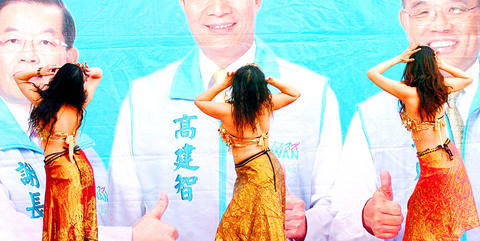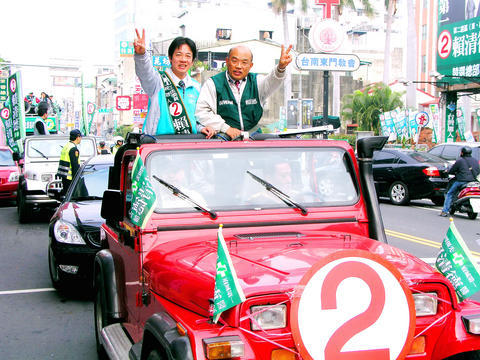With the legislative election battle reaching boiling point with less than a week to go, Democratic Progressive Party (DPP) and Chinese Nationalist Party (KMT) "big guns" engaged in non-stop campaigning around the country yesterday to stump for their prospective legislative candidates.
President Chen Shui-bian (陳水扁), who doubles as DPP chairman, was shaking hands and working the crowd in Taoyuan, Taichung and Miaoli yesterday morning. He then showed up at campaign rallies in Chunghua in the evening.
Other pan-green heavyweights such as DPP presidential candidate Frank Hsieh (謝長廷), his running mate Su Tseng-chang (蘇貞昌) and Vice President Annette Lu (呂秀蓮) also criss-crossed the nation stumping for their party's legislative hopefuls.

PHOTO: CHANG CHIA-MING, TAIPEI TIMES
The pan-blue camp's big guns also spent the last Sunday before the legislative poll on Saturday gearing up support for the KMT's legislative candidates.
Former KMT chairman Lien Chan (連戰), who had not made many public appearances recently, has been on a tight campaign schedule for the past few days. He campaigned yesterday for five candidates in Pingtung and Kaohsiung, constituencies which are considered DPP strongholds.
KMT presidential candidate Ma Ying-jeou (

PHOTO: HUANG PO-LANG, TAIPEI TIMES
Later yesterday, Ma was at a campaign rally in Kaohsiung County while KMT Chairman Wu Poh-hsiung (吳伯雄) was campaigning for a KMT candidate in Chiayi.
Ma said candidates from all around the nation had urged him to campaign for them ahead of the election.
KMT legislative caucus leader Kuo Su-chun (郭素春), an at-large candidate in this year's race, has been attending rallies around the country for fellow KMT candidates and said appearances by Ma have been an asset to their campaigns.
While candidates could judge for themselves how many votes the big names would be worth in their constituencies, Kuo said that from her experience "most KMT candidates believe the charismatic Ma appeals to the voters and they want to capitalize on it."
Lin Tsang-min (林滄敏), an incumbent KMT lawmaker locked in a tight battle in Changhua County, was one of those hoping to benefit from Ma's presence.
He said he has found that his campaign gets a real boost when Ma arrives in the county and stumps on his behalf.
Leveraging support from "Mr or Ms Popular" is becoming one of the most favored campaign tactics in this election. The "populars" are the political stars seen to be capable of livening up campaign platform presentations, fueling election battles and adding votes for the candidates they support.
For the pan-green camp, Government Information Office Minister Shieh Jhy-wey (謝志偉) is considered the most effective "Mr Popular."
DPP Legislator Chuang Suo-hang (
Chuang's comments were echoed by DPP Legislator Sandy Yen (
Other pan-green "populars" include Hsieh, Su and former vice premier Tsai Ing-wen (
Among them, Hsieh's quick wit and humor is quite popular with the candidates, making him the runner-up behind Shieh, Chuang said. President Chen and Kaohsiung Mayor Chen Chu (陳菊) are also popular star campaigners for their high fame and strong speeches, Chuang added.
DPP Legislator Tsai Chi-chang (
But not all candidates favored the political stars as their campaign stumpers.
DPP Legislator Huang Chao-hui (
Three years ago, when Huang ran for legislator, Chen Ling-li promised voters she would devote her full attention to helping her husband and give up her seat on the council should Huang be elected, Huang said.
To this day, Chen Ling-li's grassroots work with the voters during her term as councilor still offers Huang tremendous help, for which he is extremely grateful, he said.
KMT Legislator Shyu Jong-shyoung (徐中雄), who is seeking re-election in Taichung County, also said that he did not need the help of a star campaigner. Of course, he may feel a little less pressure -- the DPP failed to nominate anybody to oppose him.
One KMT candidate, who asked to remain anonymous, said he did not want party heavyweights campaigning by his side because they would manipulate partisan divisions and emphasize the "pan-green" versus "pan-blue" divide.
There were also mixed feelings in the pan-green camp toward having the big names appear on stage.
Under the old system of multi-representative districts, appealing to one's core support base was sufficient to win a seat. In this year's legislative polls, however, candidates are generally engaged in two-horse races where independent voters could decide their fates. They were voters who were likely to be less impressed by the endorsement of party heavyweights engaging in partisan rhetoric.
DPP candidate Huang Wei-cher (黃偉哲), in a tight race against incumbent Non-Partisan Solidarity Union candidate Lee He-shun (李和順) in Tainan County, felt that with the DPP's historical strength in southern Taiwan, President Chen and other party heavyweights should attend more rallies there in order to energize the DPP's core support base.
Huang said he did not worry that the president's speeches might drive away centrist voters because he had plenty of campaigning experience and knew what he should or should not say.
On the other hand, incumbent DPP lawmaker Chiu Chuang-chin (
Chiu said star campaigners were useful in boosting a campaign team's morale, intimidating opponents and giving voters the impression that the candidate had a wide range of supporters, but that they do not necessarily win more votes.
Additional reporting by Ko Shu-ling and Flora Wang

The Central Election Commission has amended election and recall regulations to require elected office candidates to provide proof that they have no Chinese citizenship, a Cabinet report said. The commission on Oct. 29 last year revised the Measures for the Permission of Family-based Residence, Long-term Residence and Settlement of People from the Mainland Area in the Taiwan Area (大陸地區人民在台灣地區依親居留長期居留或定居許可辦法), the Executive Yuan said in a report it submitted to the legislature for review. The revision requires Chinese citizens applying for permanent residency to submit notarial documents showing that they have lost their Chinese household record and have renounced — or have never

Taiwan has secured another breakthrough in fruit exports, with jujubes, dragon fruit and lychees approved for shipment to the EU, the Ministry of Agriculture said yesterday. The Animal and Plant Health Inspection Agency on Thursday received formal notification of the approval from the EU, the ministry said, adding that the decision was expected to expand Taiwanese fruit producers’ access to high-end European markets. Taiwan exported 126 tonnes of lychees last year, valued at US$1.48 million, with Japan accounting for 102 tonnes. Other export destinations included New Zealand, Hong Kong, the US and Australia, ministry data showed. Jujube exports totaled 103 tonnes, valued at

A magnitude 5.6 earthquake struck off the coast of Yilan County at 12:37pm today, with clear shaking felt across much of northern Taiwan. There were no immediate reports of damage. The epicenter of the quake was 16.9km east-southeast of Yilan County Hall offshore at a depth of 66.8km, Central Weather Administration (CWA) data showed. The maximum intensity registered at a 4 in Yilan County’s Nanao Township (南澳) on Taiwan’s seven-tier scale. Other parts of Yilan, as well as certain areas of Hualien County, Taipei, New Taipei City, Taoyuan, Hsinchu County, Taichung and Miaoli County, recorded intensities of 3. Residents of Yilan County and Taipei received

BIG SPENDERS: Foreign investors bought the most Taiwan equities since 2005, signaling confidence that an AI boom would continue to benefit chipmakers Taiwan Semiconductor Manufacturing Co’s (TSMC, 台積電) market capitalization swelled to US$2 trillion for the first time following a 4.25 percent rally in its American depositary receipts (ADR) overnight, putting the world’s biggest contract chipmaker sixth on the list of the world’s biggest companies by market capitalization, just behind Amazon.com Inc. The site CompaniesMarketcap.com ranked TSMC ahead of Saudi Aramco and Meta Platforms Inc. The Taiwanese company’s ADRs on Tuesday surged to US$385.75 on the New York Stock Exchange, as strong demand for artificial intelligence (AI) applications led to chip supply constraints and boost revenue growth to record-breaking levels. Each TSMC ADR represents